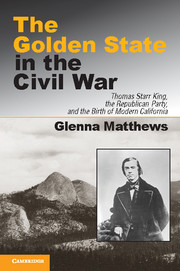 The Golden State in the Civil War
The Golden State in the Civil War Book contents
- Frontmatter
- Contents
- Preface and Acknowledgments
- Introduction
- 1 The Golden State in the 1850s
- 2 Thomas Starr King and the Massachusetts Background for His California Activism
- 3 Toward a Political Realignment
- 4 The First Years of War
- 5 The Military Front
- 6 The Cultural Front
- 7 A New Role for California Gold and a Seesaw Federal–State Relationship
- 8 “Coppery” California
- 9 Californians of Color
- 10 A Tragic Death and Its Aftermath
- Epilogue
- Index
- References
1 - The Golden State in the 1850s
Published online by Cambridge University Press: 05 April 2012
- Frontmatter
- Contents
- Preface and Acknowledgments
- Introduction
- 1 The Golden State in the 1850s
- 2 Thomas Starr King and the Massachusetts Background for His California Activism
- 3 Toward a Political Realignment
- 4 The First Years of War
- 5 The Military Front
- 6 The Cultural Front
- 7 A New Role for California Gold and a Seesaw Federal–State Relationship
- 8 “Coppery” California
- 9 Californians of Color
- 10 A Tragic Death and Its Aftermath
- Epilogue
- Index
- References
Summary
BEFORE THE GOLD RUSH
Even before the arrival of Europeans, what is now the state of California was home to a diverse, linguistically rich population. Estimates are that about 225,000 Indians lived within the region's boundaries. Gathered into tribelets of 500 to 1,000 persons each, the Indians spoke about 100 distinct languages. In the main, hunting and gathering supplied their food, but trade was important to their well-being also. Their baskets and other crafts were highly skilled productions. That the population was relatively dense compared to populations in other Indian territories attests to the fact that the California dwellers had adapted well to their environment. Their lives were not easy, but they were also not so difficult as to prevent the maintenance of healthy numbers.
After a few exploring forays over the course of many decades, the Spanish arrived permanently in Alta California (as it was then known) in 1769. On or close to the coast, they founded 21 missions, at first only three pueblos or towns, and four presidios or military installations. The Franciscans, charged with establishing and running the missions, came with hearts full of love for the native peoples they so eagerly wanted to convert to Christianity – coupled with a steely determination to bend the Indians to their will. As in much of the territory in the Spanish borderlands, Alta California would have the merest suggestion of a civil society, and it would see frequent infighting between members of the religious order and the military, there to protect the missionaries and to back up their authority with arms. In fact, there were sporadic yet ultimately ineffective attempts at Indian resistance, so the military had a job to do. Taken together, all these factors – the contradiction between the padres’ loving intentions and their will to dominate, the paucity of civilians, and the intermittent conflict between the two key elements of the Spanish population – meant that the colonizing effort would be plagued by multiple difficulties from the beginning.
- Type
- Chapter
- Information
- The Golden State in the Civil WarThomas Starr King, the Republican Party, and the Birth of Modern California, pp. 8 - 41Publisher: Cambridge University PressPrint publication year: 2012


